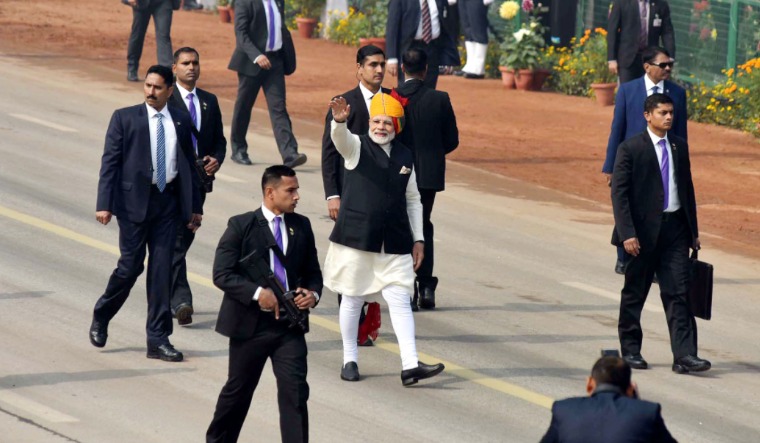In the earlier days of policing, officers of the Special Protection Group used to carry ropes and undergo training to use them effectively to stop crowds from coming near the prime minister. Times have changed and so have threats to the prime minister whose convoy includes jammers to block threats like mobile phone-triggered explosions and hostage situations.
As the Supreme Court on Wednesday appointed an inquiry committee to look into the security lapses that happened during Prime Minister Narendra Modi's visit to Punjab on January 5, all eyes are on the decades-old ‘Blue Book’ instructions issued by the Union home ministry. The Blue Book lists each and every security detail that needs to be followed during the PM's movement.
Former SPG chiefs and officers involved in escort duties of VIPs, including the prime minister, feel there is a need to review the Blue Book more effectively to factor in situations like those leading to Modi's cavalcade being stuck on a flyover.
Former SPG chief Durga Prasad said a breach of this kind is unacceptable and requires a thorough inquiry. “The onus lies with the state police during the PM's travel to any part of the country but the fact is that this kind of lapse is unacceptable. There was some gap somewhere that needs to be plugged,” he said.
Though home ministry officials said the Blue Book is reviewed and updated regularly, it is still a very old document made at a time when the security challenges were very different. “Technological advancements have led to drastic changes in the way VIP security needs to be handled,” said another ex-SPG officer. Until as late as 2016, the SPG is learnt to have been pushing for certain changes in the Blue Book. These changes can only be made by the Union home ministry in consultation with the Intelligence Bureau. It is learnt that some of these suggested changes demand a review at the earliest.
The Blue Book mandates the SPG to hold advance security liaison meetings with IB, state police and district magistrate three days before a visit by the PM and these plans are even reviewed two hours ahead of the travel. At these meetings, the smallest details are chalked out. “If the Blue Book has to be followed in letter and spirit, it must also reflect the current challenges and scenarios,” said a security official. Decisions about how the PM will be escorted, the inputs of various intelligence agencies and contingency plans can then be effective at all levels and capable of handling any emergency situation, added the official.
At the moment, the reasons for the grave lapse will be probed by the inquiry committee headed by retired Supreme Court justice Indu Malhotra who will be assisted by director-general of the National Investigation Agency Kuldeep Singh, director general of police of Union Territory of Chandigarh, ADGP (security) of Punjab and the registrar general of the Punjab and Haryana High Court (who has seized the records relating to PM's visit).
Kuldeep Singh already has his hands full as full-time DG of CRPF. Presently, he is acting DG of NIA. But with senior IPS officers demanding an NIA inquiry into the episode, it seems Singh's inputs will be crucial for the inquiry committee to come to a conclusion about how the lapse took place. The points of reference of the committee are to see who was responsible for the security breach and to what extent and suggest remedial measures or safeguards necessary to ensure security of constitutional functionaries.
Former IB special director D.P. Sinha said the fatal lapses in Indira Gandhi's security speaks volumes about the all-important role of each security officer guarding the prime minister. In Gandhi's case, the first to react was Dinesh Bhatt, the prime minister's personal security officer on duty, but soon the carefully rehearsed emergency drill involving hundreds of security personnel was shattered to pieces.
also read
- Colonial-era IPC gives way to new criminal laws from Monday; key takeaways
- Home ministry extends ban imposed on LTTE for 5 years
- CPR diverted foreign funds for ‘protests and legal battles’ against developmental projects: MHA
- Exams for constables in CAPFs to be conducted in 13 regional languages, Hindi and English
There have also been instances when the VIPs have broken security protocol and agencies have tided over difficult situations to secure them. Some of them have got down and walked and some others have returned midway after not getting clearance by the state police at the last moment. Some others have simply been an act of quick wit shown by escort duty officers. Once P.V. Narasimha Rao was visiting a university in Hyderabad when he was prime minister and certain protesters had blocked the road. The then officer in charge of escort duty was well versed with the map of the city and quickly changed the plan with a small detour. He called the commissioner and informed him about his plan. When the PM's convoy left the venue, all it used was an alternate route to avoid getting into a traffic nightmare.





